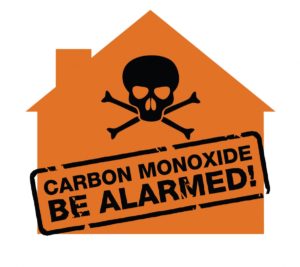
The Seattle area has seen a few windstorms already this winter that have knocked out power to thousands of homes. One danger we have during power outages is the increased possibility of carbon monoxide (CO) poisoning.
 Carbon monoxide is produced any time fossil fuels are burned. During a power outage, the use of gas generators, outdoor grills, in carports or too close to the home can trap CO in the home and cause CO poisoning. Other possible sources of CO include small gasoline engines, stoves, lanterns, burning charcoal and wood, and gas ranges and heating systems.
Carbon monoxide is produced any time fossil fuels are burned. During a power outage, the use of gas generators, outdoor grills, in carports or too close to the home can trap CO in the home and cause CO poisoning. Other possible sources of CO include small gasoline engines, stoves, lanterns, burning charcoal and wood, and gas ranges and heating systems.
Carbon monoxide is a gas that can cause severe illness or death. What makes it so difficult to detect is that it is odorless and colorless. According to the Centers for Disease Control and Prevention, at least 430 people die from accidental carbon monoxide poisoning in the United States every year. And each year, around 50,000 people go to the emergency department from CO poisoning.
Here are ways to keep your family safe from carbon monoxide poisoning.
- Do not use items that produce carbon monoxide inside your home or garage or outside an open window.
- Never use gas ovens to heat your home, even for a short time.
- If you use a fireplace or wood stove, make sure that chimneys and flues are in good condition and are not blocked.
- Never idle a car in a garage, even when the garage door is open.
- Make sure carbon monoxide alarms are installed on every level of your home and outside every sleeping area. Test your CO alarms along with your smoke alarms monthly and change the batteries at least once a year.
If the CO alarm sounds, turn off any heating appliance and open windows to get fresh air. Call 911 if you experience CO poisoning symptoms such as dizziness, vomiting, or headaches and move to fresh air immediately. If you suspect an appliance is the source, call a qualified technician to fix the problem before restarting the appliance.
Learn more about CO poisoning and prevention in several languages from Public Health Seattle & King County and the Centers for Disease Control and Prevention
Seattle Fire Department Carbon Monoxide Poisoning Prevention Handout